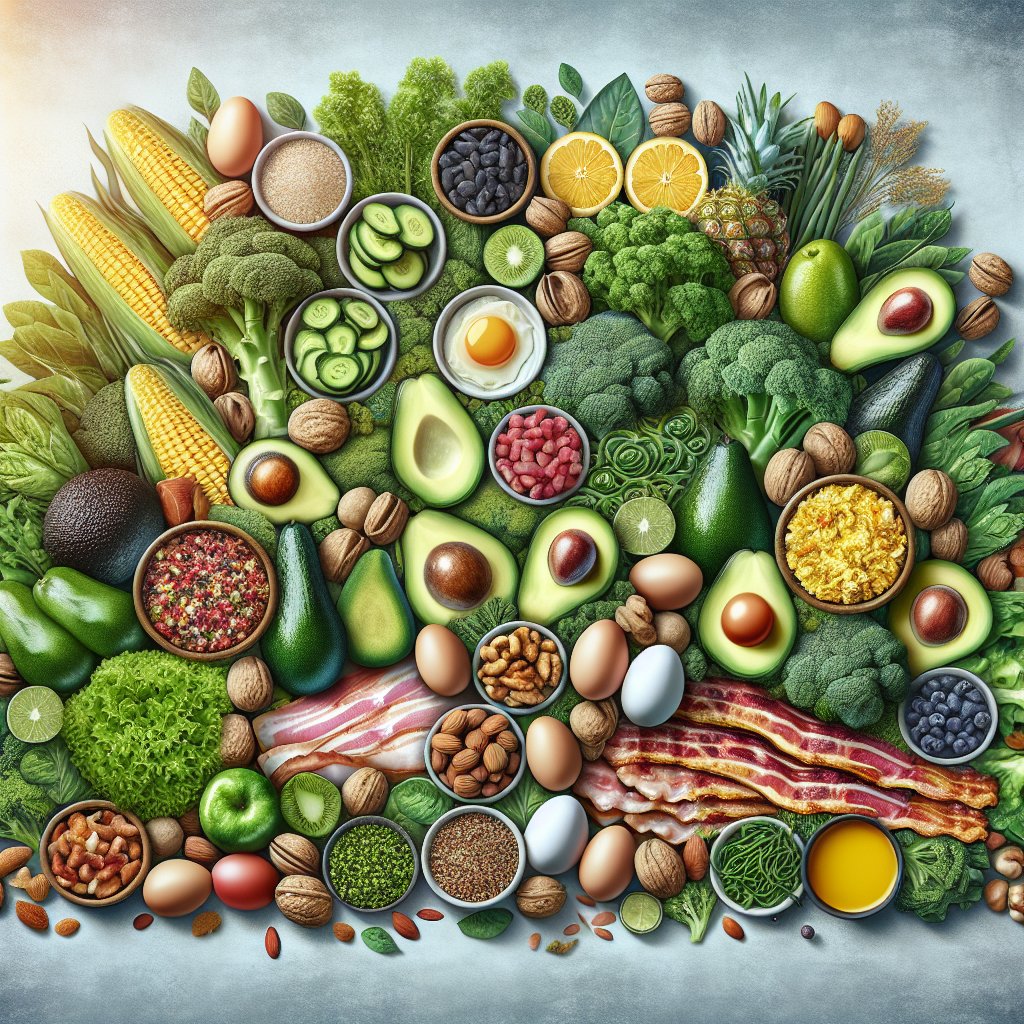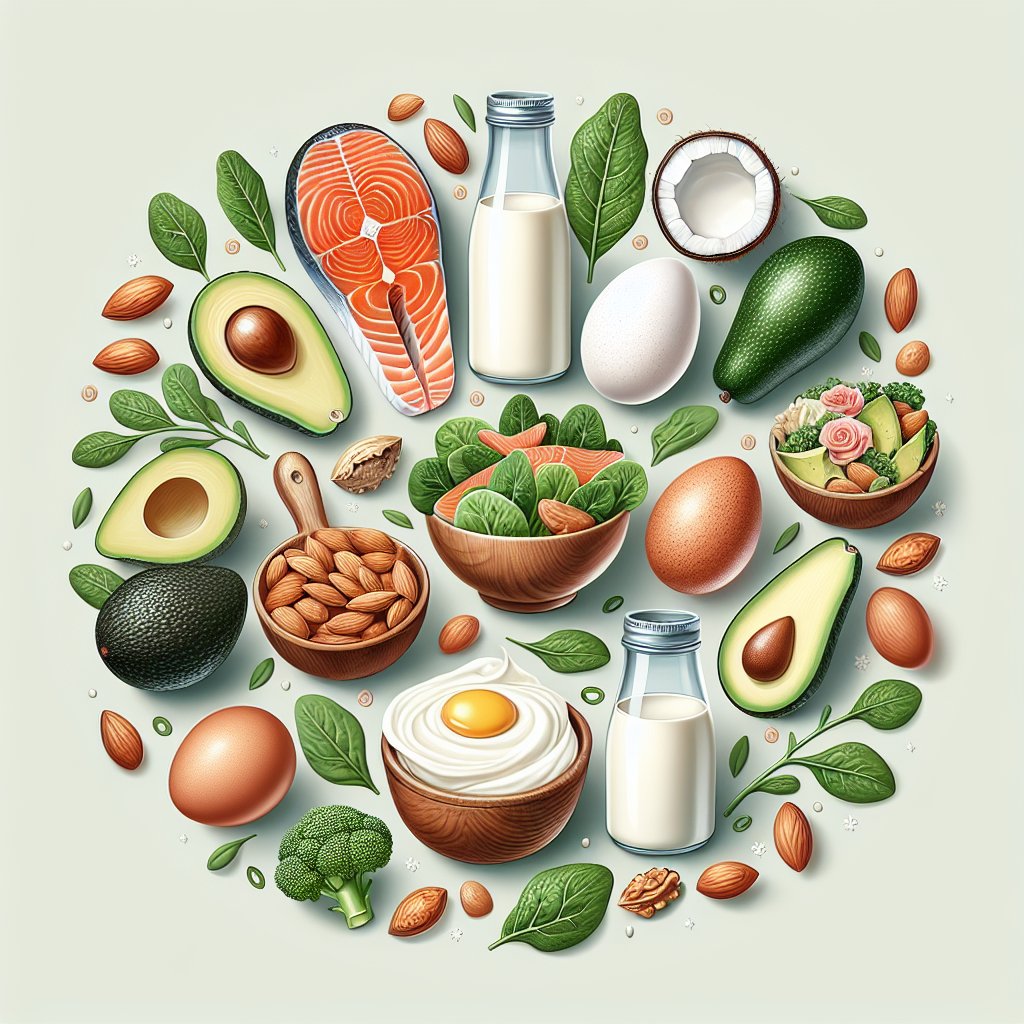Is Milk OK for Keto Diet? Understanding the Best Foods for Your Ketogenic Journey
Explaining the Popularity of the Keto Diet
Have you ever wondered why the ketogenic or keto diet has gained so much traction in recent years? What is it about this way of eating that has captured the imagination of so many people and inspired them to embrace this lifestyle? Let’s dive into the reasons behind the popularity of the keto diet and why understanding which foods are suitable for it is essential for your ketogenic journey.
The keto diet has become incredibly popular mainly due to its remarkable effectiveness in helping individuals achieve their weight loss and health goals. Scientific research has shown that the ketogenic diet can aid in weight loss, improve insulin sensitivity, and even offer neuroprotective benefits. These benefits have piqued the interest of individuals seeking a sustainable and effective way to manage their weight and overall well-being.
Beyond the science, the keto diet’s popularity can also be attributed to the countless success stories that have emerged from individuals who have embarked on this journey. People are drawn to the diet because of the inspiring experiences of others who have achieved significant weight loss, improved energy levels, and better overall health through following a ketogenic lifestyle.
Understanding Which Foods are Suitable for the Keto Diet
Now that we’ve explored the reasons behind the popularity of the keto diet, it’s crucial to understand which foods are suitable for this way of eating. At its core, the keto diet is a high-fat, moderate-protein, and low-carbohydrate eating plan. The primary goal is to shift your body into a state of ketosis, where it burns fat for fuel instead of carbohydrates.
For the keto diet to be effective, it’s essential to focus on consuming foods that are low in carbohydrates and high in healthy fats. This means saying yes to foods like avocados, nuts, seeds, and healthy oils while being mindful of restricting high-carb foods such as grains, starchy vegetables, and sugary treats.
Understanding the macronutrient breakdown of foods is crucial for successful adherence to the keto diet. It’s important to check the carbohydrate content of various foods and ensure that they align with your daily carb limits. Additionally, incorporating adequate protein while prioritizing healthy fats is vital for sustaining ketosis and reaping the full benefits of the diet.

Benefits of the Keto Diet
Are you looking to shed some extra pounds, improve your overall health, and increase your energy levels? The ketogenic diet might be just the thing for you. This low-carb, high-fat diet has been gaining popularity due to its numerous benefits for weight loss and health improvement. Let’s dive into the advantages of the keto diet and how it can positively impact your life.
Weight Loss
One of the most significant advantages of the keto diet is its effectiveness in weight loss. Research published in the International Journal of Environmental Research and Public Health has shown that the ketogenic diet can lead to greater weight loss compared to a low-fat diet. By reducing carb intake and increasing fat consumption, the body enters a metabolic state called ketosis, where it burns fat for fuel. This can result in rapid and substantial weight loss, especially in the initial stages of the diet.
Health Improvement
In addition to weight loss, the keto diet has been linked to various health improvements. Studies have indicated that the ketogenic diet can help lower risk factors for diseases such as heart disease, diabetes, and metabolic syndrome. The diet may lead to improved blood sugar control, reduced inflammation, and lower blood pressure. Furthermore, the increased consumption of healthy fats can have a positive impact on cholesterol levels, promoting overall heart health.
Embracing a ketogenic lifestyle may also support brain health and function. Research suggests that the diet could have neuroprotective benefits, potentially aiding those with neurological disorders like epilepsy and Alzheimer’s disease. Moreover, some individuals report experiencing enhanced mental clarity and focus when following a keto meal plan.
It’s essential to note that the benefits of the keto diet extend beyond weight loss. The positive impact on overall health and well-being further contributes to its appeal among individuals seeking sustainable lifestyle changes.
Understanding the advantages of the keto diet for weight loss and health improvement can inspire many individuals to embark on this transformative journey. Whether you’re looking to shed excess weight, improve your metabolic health, or enhance your overall well-being, the keto diet holds immense potential for positive change.

What is the Keto Diet?
So, you’ve heard about the keto diet, but what is it exactly? At its core, the ketogenic diet is a high-fat, moderate-protein, and very low-carb eating plan. But why is it so popular? One word: results! The keto diet is designed to shift the body’s metabolism away from burning carbohydrates for energy and toward burning fat. By drastically reducing carb intake and replacing it with healthy fats, your body enters a state of ketosis, where it becomes incredibly efficient at burning fat for fuel.
Research has shown that the keto diet can lead to significant weight loss and provide numerous health benefits, including improved blood sugar control, enhanced mental focus, and increased energy levels. It has also been found to be beneficial for those with certain medical conditions, such as epilepsy and type 2 diabetes.
While it may seem counterintuitive to consume high amounts of fat, it’s important to remember that not all fats are created equal. Healthy fats, such as those found in avocados, nuts, seeds, and oily fish, are the cornerstone of the keto diet. In fact, studies have shown that a well-formulated ketogenic diet can lead to a reduction in body weight and body mass index, along with improvements in total cholesterol, LDL cholesterol, and HDL cholesterol levels.

Is Milk OK for Keto Diet? Understanding the Best Foods for Your Ketogenic Journey
Milk and its Macronutrients
When it comes to the ketogenic diet, understanding the nutritional content of different foods is crucial. Let’s take a closer look at the macronutrients in milk and assess whether it’s suitable for a keto diet.
First off, the carb count in milk can be a concern for those following a keto lifestyle. A cup of whole milk contains around 12 grams of carbohydrates, which might be too high for some individuals aiming to remain in ketosis. However, there are lower-carb alternatives such as unsweetened almond milk or unsweetened coconut milk, which contain as little as 1-3 grams of carbohydrates per cup, making them more keto-friendly options.
Next, let’s talk about the fat content in milk. Whole milk is higher in fat, with approximately 8 grams of fat per cup. The high fat content aligns well with the macronutrient requirements of a keto diet, where fat intake is emphasized for energy and satiety. However, for a lower fat option, unsweetened almond milk or coconut milk can be suitable choices, providing healthy fats in a keto-friendly format.
Now, moving on to the protein levels in milk. A cup of whole milk typically contains around 8 grams of protein. Protein is an essential macronutrient for the maintenance of muscle mass and overall body function. While milk can contribute to protein intake, it’s noteworthy that there are other protein sources with lower carbohydrate content, such as lean meats, fish, and eggs, which might be more favorable for those on a keto diet.
In summary, while regular cow’s milk may pose challenges due to its carb content, there are low-carb, keto-friendly alternatives like unsweetened almond milk and unsweetened coconut milk that can be incorporated into the ketogenic diet. These options provide the creamy texture and taste of milk while being more aligned with the macronutrient goals of a keto lifestyle.

Is Milk OK for Keto Diet?
If you’re on a ketogenic diet, you might be wondering if milk is compatible with this way of eating. Let’s take a closer look at milk’s carb content and its impact on ketosis to see whether it’s a good fit for your keto journey.
Analyzing Milk’s Carb Content
Milk contains lactose, a type of sugar, which contributes to its carbohydrate content. An 8-ounce glass of whole milk has approximately 11-12 grams of carbohydrates. If you opt for reduced-fat or skim milk, the carb content may decrease slightly, but it still remains relatively high compared to other keto-friendly beverages.
For individuals following a standard ketogenic diet, which typically allows no more than 50 grams of carbs per day, a single glass of milk can quickly take up a significant portion of your daily carb allowance.
Impact on Ketosis
The primary goal of the ketogenic diet is to induce a state of ketosis, where the body relies on fat for fuel due to the limited availability of carbohydrates. Consuming high-carb foods, such as milk, can potentially kick you out of ketosis, making it challenging for your body to maintain the desired fat-burning state.
Research studies, such as a 2016 review published in the Nutrition & Metabolism journal, indicate that reducing carbohydrate intake is crucial for initiating and sustaining ketosis. This means that while milk is a nutritious beverage, its higher carbohydrate content may not align with the strict carb restrictions of the keto diet.
Exploring Keto-Friendly Alternatives
If you’re a fan of milk but want to stay in ketosis, fear not! There are several keto-friendly alternatives that you can incorporate into your daily routine. Unsweetened almond milk, coconut milk, or macadamia nut milk are great low-carb options that provide a creamy texture and can be used in various recipes, from smoothies to keto-friendly desserts.
These alternatives typically contain fewer than 2 grams of net carbs per serving, making them a suitable choice for those aiming to minimize their carbohydrate intake while staying within the boundaries of the keto diet.
Final Thoughts
While milk is a wholesome and versatile beverage, its carb content may not make it the best fit for individuals committed to achieving and maintaining ketosis. By opting for keto-friendly milk alternatives and staying mindful of your carb consumption, you can continue to enjoy a wide array of delicious and nutritious beverages while staying loyal to your keto lifestyle.
In conclusion, understanding the impact of milk on a keto diet ultimately empowers you to make informed choices that align with your health and wellness goals.
Is Milk OK for Keto Diet? Understanding the Best Foods for Your Ketogenic Journey
Alternatives to Milk on Keto
If you’re following a keto diet, you may be wondering if milk is okay to include in your meal plan. While milk contains essential nutrients, it also has a relatively high carb content, which can make it challenging to fit into a low-carb lifestyle. Don’t worry, though – there are plenty of tasty and keto-friendly alternatives to traditional cow’s milk that you can enjoy without compromising your goals.
Almond Milk
One of the most popular milk substitutes for those on a keto diet is almond milk. Not only is almond milk low in carbs, but it also offers a creamy texture and a slightly nutty flavor that can enhance your favorite keto recipes. Additionally, almond milk is fortified with vitamins and minerals, such as calcium and vitamin D, making it a nutritious choice for your keto journey.
Coconut Milk
Another excellent low-carb milk substitute is coconut milk. It has a rich and indulgent taste that works well in both sweet and savory dishes. Coconut milk is also a source of medium-chain triglycerides (MCTs), which have been shown to support ketone production in the body, making it a great option for those on a ketogenic diet.
Unsweetened Soy Milk
For individuals who are not allergic to soy and looking for a plant-based low-carb alternative to milk, unsweetened soy milk can be a suitable choice. With its creamy consistency and high protein content, unsweetened soy milk can be a versatile addition to your keto-friendly beverages and recipes.
When selecting milk substitutes for the keto diet, it’s essential to opt for unsweetened varieties to avoid added sugars and excessive carbs. Always check the nutrition label to ensure the product is low in carbs and free from added sugars, as these can hinder ketosis.
By choosing low-carb milk substitutes like almond milk, coconut milk, or unsweetened soy milk, you can continue to enjoy creamy and flavorful beverages and dishes while staying on track with your keto lifestyle.
Throughout your keto journey, it’s important to pay attention to the nutritional content of the foods you consume, including any milk substitutes. Choosing low-carb options like almond, coconut, or unsweetened soy milk can contribute to your overall macronutrient balance and support your ketogenic goals.
In the next section, we’ll discuss the impact of dairy milk on ketosis and explore whether it can be a part of your keto diet, so keep reading to gain valuable insights into making the best food choices for your ketogenic lifestyle.
Conclusion: Is Milk OK for Keto Diet?
As we wrap up our discussion on including milk in a keto diet, it’s essential to consider the key points we’ve covered and provide final thoughts on this dairy product and its compatibility with the ketogenic lifestyle.
Key Points to Consider
Throughout this article, we have explored the nutritional composition of milk, its impact on blood sugar and insulin levels, its carb content, and its potential effects on ketosis. We have discussed that while milk is nutrient-rich and a good source of protein, it contains lactose, a naturally occurring sugar that can affect blood glucose levels. The lactose content and the carb count in milk must be managed and factored into the daily carb limit on a keto diet.
We also looked at the differences between whole milk, low-fat milk, and non-dairy milk alternatives, emphasizing the importance of understanding their respective carb and fat content. It’s crucial to make informed choices that align with your daily macronutrient targets when incorporating any type of milk into a keto meal plan.
Final Thoughts
When it comes to the question “Is milk OK for keto diet?” the answer is not a simple yes or no. It largely depends on individual tolerance, carb budget, and overall dietary preferences. While some individuals may successfully include small amounts of milk in their ketogenic diet without hindering their progress, others may need to explore alternative options to better manage their carb intake.
It’s also important to note that individual responses to dairy can vary significantly. Some people may experience digestive issues or stall their weight loss when consuming milk, while others may not face any adverse effects. Understanding your body’s response to milk and being mindful of portion sizes and carb intake is key to determining whether milk can be a part of your keto journey.
For those who opt to include milk, it’s advisable to prioritize unsweetened and full-fat options, such as whole milk or creamy non-dairy alternatives, to minimize the impact on blood sugar levels. Additionally, monitoring portion sizes and considering milk as part of your overall daily carb allocation is crucial for maintaining ketosis and reaping the benefits of a ketogenic diet.
Ultimately, the decision to include milk in a keto diet should be based on individual needs, health goals, and tolerance levels. It’s about finding a sustainable approach that supports overall well-being while keeping carb intake within the targeted range for ketosis.
As with any dietary choice, consulting with a healthcare professional, such as a registered dietitian or a healthcare provider knowledgeable about the ketogenic diet, can provide personalized guidance and ensure that milk consumption aligns with your unique nutritional requirements and health objectives.
So, is milk OK for keto diet? The verdict is that with careful consideration, mindful consumption, and awareness of individual responses, milk can be included in a keto diet for those who can accommodate its carb content within their daily limit while maintaining ketosis.


